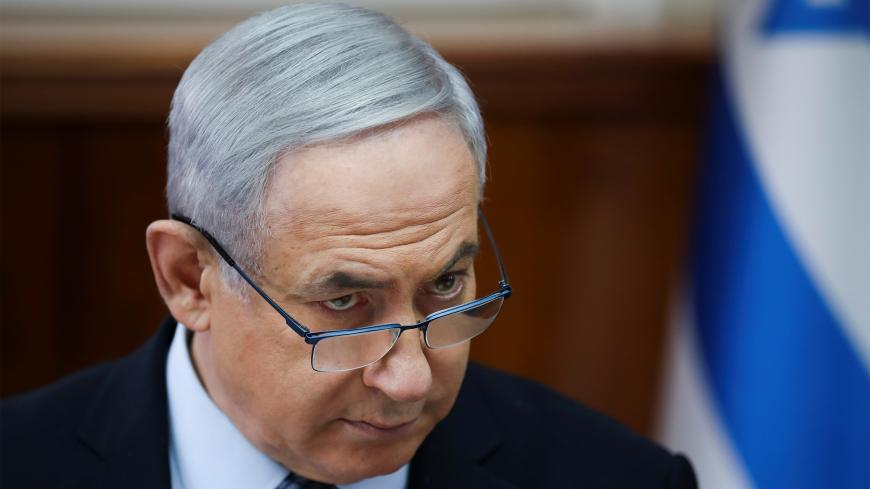Prime Minister Benjamin Netanyahu seems to have a security window of opportunities at the moment, made possible by timing and circumstances, in particular his complicated situation. He has nothing to lose and plenty to gain, but will he take advantage of that window to launch a preemptive strike on the infrastructure developed by Hezbollah for producing rockets and precision missiles and that is becoming more firmly established in Lebanon?
The annual forecast for the coming year released by the Jerusalem Institute for Strategy and Security on Dec. 15 includes the following explosive statement: “Preparations are necessary for aggravated scenarios, including a possible Israeli decision to launch a preemptive strike on Hezbollah.” That one sentence lit a fire under the Israeli defense establishment and also set in motion a tsunami of speculation about the possibility of a conflagration on Israel's northern front.
The staff of the Jerusalem Institute consists of experienced experts, many of whom still have ties to Israel’s defense and intelligence establishments. The most prominent of them is Maj. Gen. (res.) Yaakov Amidror, a former national security advisor to Netanyahu. Amidror is clearly identified with the right, but he was never the kind of adventurer who wanted to implement solutions by force. To the contrary, during his years working with Netanyahu, he earned the reputation of being the responsible adult in the Prime Minister’s Office and was seen as having a close strategic relationship with his American counterpart, Tom Donilon. In short, he was perceived as one of the people in the prime minister’s inner circle capable of convincing the government to show some restraint.
“I think we need to seriously consider a preemptive strike in Lebanon,” Amidror told Al-Monitor. “We made two fatal strategic errors in the past in our dealings with Hezbollah. One more mistake will leave us regretting it for generations to come. We must not let Hezbollah cross that red line.”
When asked what mistakes he was talking about, Amidror responded, “The first mistake was that we let the organization grow dangerously powerful when we withdrew from Lebanon after the First Lebanon War. The second mistake was that we didn’t insist that Security Council Resolution 1701 be enforced after the Second Lebanon War. Now Hezbollah has grown to almost monstrous proportions. We will pay a very steep price if we allow it to have such a large number of rockets and precision missiles. Israel is a tiny country. We have very few advantages, so we cannot make that mistake. We are now facing a watershed moment. We must be prepared to bear the cost of a preemptive attack if it turns out that Hezbollah has, in fact, accumulated capacities that it did not have in the past that would bring about a drastic shift in the balance of power. As soon as the Hezbollah monster acquires exceptional capacities, we would be facing a tiebreaker. Under no circumstances may we allow that to happen.
Does the Jerusalem Institute’s prediction encompass the thoughts and opinions only of Amidror and his colleagues at the institute or does it also reflect the possibility that a preemptive Israeli strike is already starting to take shape? Amidror denies that the assessment was based on intelligence briefings.
“I am no longer part of the system, and I do not know if such an attack is possible during an election campaign period,” he said. “What I do know is that Netanyahu is capable of making such a move in principle, but I don’t know if he can do so in practice. If so, he would first have to coordinate the move with [Blue and White leader] Benny Gantz, and that would have to happen while they are running against each other in the election. If he does invite Gantz to a meeting, updates him and receives his consent to such a move, he would be stripping an attack of any political opposition. Will that happen? I don’t know. What I can tell you is that it is what should happen.”
Despite all this, the vast majority of security sources in Israel, including the most senior defense commentators, agree that the chances are not especially high of Israel initiating a widespread preemptive strike against Hezbollah’s rocket and missile infrastructure.
“Israel has not launched a preemptive strike since it was founded,” a senior defense establishment official told Al-Monitor, speaking on the condition of anonymity. “It would only make an exception to this rule in the event of nuclear developments, which is why it destroyed nuclear reactors on two separate occasions: the first in Iraq and the second in Syria. Israel did not attack Egypt’s ground-to-air missile batteries before the 1973 Yom Kippur War, nor did it launch attacks like that in similar circumstances. This is a permanent dilemma facing the defense establishment.” The source then added, “And yet not one step forward has been taken until now, given the growing threat posed by our enemies.”
It is important to consider a couple of variables in regard to analyzing the current situation. The first is Netanyahu's own situation. The election scheduled for March 2 could very well be his last. His time in politics is running out. Short of a miracle, he will be leaving the political arena in the coming year. Before the upcoming vote is his last chance to leave a legacy of deeds, not just of speeches and rhetoric. Even having to play a political price, something that Netanyahu feared throughout his career, is no longer relevant. A preemptive Israeli strike against Hezbollah would mean a comprehensive war in the north in which Israel would suffer vast, unprecedented damage. Yet, even this would not worry Netanyahu too much. He is already on his way out because of corruption-related indictments against him, so he can only benefit, rather than be harmed politically, by military action.
The second variable is Israel's new defense minister, Naftali Bennett. He is young, chock full of energy and eager to make contact with the enemy at almost any price. Bennett has already begun to grow frustrated with all the restrictions placed on him in handling the situation in Gaza. Despite his bellicose statements over the past few years, his appointment did not result in a shift in the strategy with which Israel contains the whims of Hamas and its allies in Gaza. The handling of the northern front, however, seems to have Bennett’s signature all over it. He has made increasingly aggressive statements about it over the last few weeks and on Dec. 18 declared, “Syria is becoming Iran’s Vietnam.” That said, he might find himself in Lebanon, which would once again become Israel’s Vietnam.
Nevertheless, there is a system of checks and balances within the Israeli defense establishment that is supposed to filter and tone down political pressure to act militarily. “I find it hard to believe that Chief of Staff Aviv Kochavi will lend his support to a comprehensive preemptive strike initiated by Netanyahu and Bennett,” one senior defense official told Al-Monitor on the condition of anonymity.
Countering this assessment is the deep concern shown by Gabi Ashkenazi (Blue and White), the new chair of the Knesset Foreign Affairs and Defense Committee and former military chief of staff. People close to Ashkenazi have reported that since being appointed committee chair and given access to the latest intelligence reports, he has become more worried and concerned than in the past. Could that be why he was the only person among Blue and White's leadership who supported entering into a rotation coalition with Netanyahu and with Netanyahu serving first?
The most up-to-date assessment of most Israeli security sources is that the odds are low for a comprehensive, preemptive strike by Israel against Hezbollah’s rocket and missile infrastructure. To make such a decision, Netanyahu would need the kind of political clout that he doesn’t have, while the defense establishment would need vast amounts of precise intelligence that it might not have. On the other hand, the chances of a comprehensive clash or even a full-blown war along the northern border exist and are growing with time. Such a conflagration could be the result of what is commonly called a “miscalculation,” possibly an Israeli operation followed by retaliation from Hezbollah and then mutual escalation. This is the most likely scenario for a comprehensive war along the northern front, a war that neither of the parties wants right now, but one that could happen anyway of its own accord.







